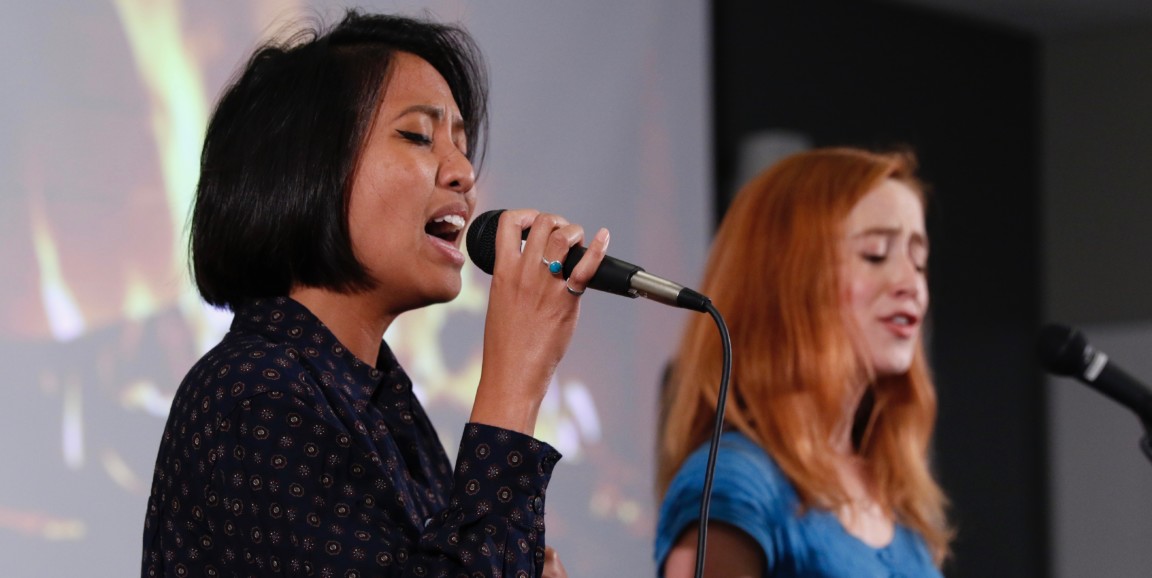Six is the number of fireplace images, projected on screens, that the organizers of Stanford Medicine Open Mic decided were necessary to transform two medical school classrooms into a space as warm as a living room. White lights trapezing over folded tables completed the look.
I sat in the front row, as close as possible to those tiny white lights feeling excited — this was my first open mic. The open mic program began with support from Medicine and the Muse program and is supported by the Stanford Medicine Arts Collective, an organization led by Ryan Brewster, a third-year medical student.
“It’s my first time being MC, so be gentle,” said Bright Zhou, a second-year medical student. “We were musicians before we were in med school. We didn’t bury that. Everyone’s really busy. Open mic gives people a chance to sing.”
And not just sing. Twice a quarter any medical and graduate bioscience student and other members of the Stanford medicine community, including residents, faculty and staff can sign up to do just about anything: perform comedy, play an instrument, dance, or improvise.
They come in sweat pants, blue v-neck scrubs, slacks and lab coats. More than 100 people came out to watch this first open mic of fall quarter. For many first years, this is an opportunity to share a different part of themselves with their peers, and the first chance upperclassmen have to meet the first years in an environment that doesn’t involve hand sanitizer.
Zhou’s words, “be gentle,” turned out to be more like an anchor than a warning. I have not been among such a loving, supportive audience at Stanford University.
“We don’t have a name,” said Shamik Mascharak, a second-year medical student, laughing, sitting atop a drum. There was no hesitation. He pounded the drum under him with careful folded fingers as he performed with second-year Stephen Marcott and new medical student Jamasb Sayadi.
Then, Michelle Han, a fourth-year medical student, performed “The Great Train Race,” releasing great sooty puffs and mechanical train tuts on her flute. I listened, mesmerized by her agile fingers and concentrated joy as she played.
In front of one of the "blazes", second-year physician assistant students Sara Wright and Marian Padilla sang an inspirational piece. “We’re doing a song called, ‘We Won’t Give Up,’ because we felt like we needed that mid-quarter,” Wright said.
Performer John Austin, a second-year medical student, meanwhile, wore a white lab-coat and a straight face as he "lectured" the audience and adjusted his glasses.
“Risk factors” for medical school include high GPA, high MCAT scores... Symptoms include insomnia, anxiety… and delusions of grandeur,” Austin joked. The prognostic factors: a smile indicates a good outlook. Frowning may indicate a worrisome outlook. And a “neurosurgery residency is terminal.”
But perhaps the most heartwarming, gentle moment of the night came when first-year medical student Chelsea Nnebe was waiting for her phone to be connected to speakers. After sharing her password, on mic, there was a brief pause while the file loaded. “I’m not funny,” she said. Someone from the audience yelled out, “Yes, you are!”
Nnebe laughed, the file loaded, and she sang an original song over the instrumentals to “Ain't Misbehavin’” by Ray Charles in a voice that made me nostalgic for some part of myself that I’ve forgotten and cannot name.
The fires burned and crackled. These students conjured mana. And they conjured it fast. Just as soon as it had begun, it was over. They gathered coffee cups and repositioned backpacks. Phones were checked. The door opened and closed and bright fluorescent light rushed in.
The next open-mic will be in early November.
Christy Hartman is the program coordinator for Medicine and the Muse.
Photo of Marian Padilla and Sara Wright by Paul Sakuma




